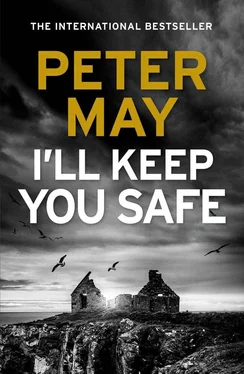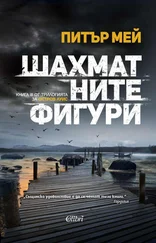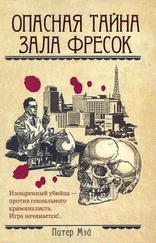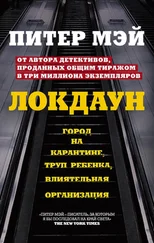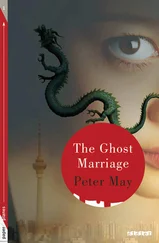She was almost startled when the door opened. A man of around fifty, with dyed black hair and a grey weary face, walked briskly into the room carrying a brown briefcase. He wore jeans that were a little too tight for him. His white shirt, tucked in at the waist, stretched across an oddly protuberant belly on an otherwise skinny body. The woman from the square followed him in. She had dispensed with the shawl, and her open-necked blouse revealed a hint of modest cleavage. Her pearl necklace, pencil skirt and high heels seemed distinctly inappropriate, as if she were on a romantic night out with a lover, instead of entering a police interview room. Niamh saw now that she was probably only a year or two younger than herself, soft shiny hair tumbling around a face that was unlikely to turn heads, but was not unattractive.
They sat in the two seats opposite Niamh, and the man dropped a modest folder on to the table in front of him. But he didn’t open it. He reached down and from his briefcase took out a small digital recorder which he placed beside it. A red light began winking when he pressed a button on one side.
Niamh smelled cigarettes off his clothes, and on the stale air that he drew from his lungs and breathed across the table at her. She jumped focus to the faded Défense de Fumer sticker on the wall behind him, then back to the orange nicotine stains on his fingers. As some kind of deflection from dwelling even for one moment on the events of earlier that night, she wondered if they made him stand and smoke outside in the cold and the rain these days. Long gone, the smoke-filled interview rooms of old.
Then awareness that he was speaking invaded her consciousness. ‘This is Lieutenant Sylvie Braque,’ he said. ‘Of the Police Judiciaire. Brigade Criminelle.’ His English was heavily accented. Niamh’s eyes strayed momentarily towards Braque then back again to the smoker. ‘I am Commandant Frédéric Martinez, of the SDAT.’ He paused. ‘You know what that is?’
She shook her head.
‘ Sous-direction anti-terroriste . The Anti-Terrorism Sub-Directorate. Also of the Police Judiciaire.’
For the first time, Niamh was shaken out of her torpor. ‘Terrorism? You think this was a terrorist attack?’
‘France is still on high alert, Madame, after recent events. Any such incident is regarded as a possible attentat .’ He paused to draw breath, and Niamh wondered if he wished it were smoke he was sucking into his lungs. ‘However, there are several reasons why we are looking at other causes. Not least because the bomb blast was directed upwards, deliberately aimed at inflicting maximum damage to the occupants of the car.’
Niamh clenched her teeth to stop her jaw from trembling. Did he not understand that he was talking about her Ruairidh?
He appeared oblivious. ‘A terrorist bomb would have been designed for maximum carnage, sending shrapnel in every direction. In which case you would not have been sitting here tonight. Miraculously collateral damage has been minimal. No one else was killed.’ He opened his folder now, and scanned the few pages it contained. ‘We have established that the vehicle did indeed belong to Irina Vetrov, and we have several witnesses who saw both her and your husband getting into it and driving off. What we don’t know is why someone put a bomb under it.’ He raised his eyes towards Niamh, and the question was there in their opaque milky brown.
Niamh found her voice with difficulty. ‘I have no idea.’
He nodded and took out a pen. ‘Let’s get one or two details for the record, shall we? Your husband’s name was...’ He hesitated. ‘Roo... Roooai...’
‘It would be easier for you just to say Rory,’ Niamh said. ‘It’s a Scots Gaelic name. That’s the English pronunciation.’ How often had they been forced to trot out the same explanation over the years. For them both. ‘And in case you’re wondering, my name is pronounced Neave .’ She spelled out both names.
Martinez gave up trying to follow her and scribbled down their phonetic representations. Then, ‘Macfarlane,’ he said carefully. She nodded. ‘And what were you and... Rory... doing here in Paris?’
‘We were attending Première Vision at the Parc des Expositions.’
He frowned. ‘Which is what?’
‘It’s the world’s biggest international fabric fair, Commandant,’ she said wearily. This all seemed so prosaic. Irrelevant. Ruairidh was dead. ‘Top fashion designers and clothing manufacturers from around the world come to Paris twice a year to buy the fabrics that will appear on the catwalks and in the stores the following season.’
‘And why were you there?’
Niamh closed her eyes and tried to summon the will to find answers to the smoker’s questions. It was hard to think beyond the grief. ‘Ruairidh and I were not just life partners. We were business partners. A small weaving enterprise in the Outer Hebrides of Scotland called Ranish Tweed.’
‘Like Harris Tweed?’
Niamh never ceased to be amazed by how many people had heard of Harris Tweed around the world. A fabric created by a handful of weavers in their own homes on a tiny archipelago off the extreme north-west of Europe. From somewhere she found the palest of smiles. ‘ Like Harris Tweed. But different.’
The first time that Ruairidh spoke to me about Ranish it came completely out of the blue.
By then I had already succumbed to what seemed like the inevitable, although I had been resisting it for long enough. And I still don’t really know why I gave up my career in favour of home-making and motherhood. Except that somehow it was what had been expected of me all my life.
After university, I worked in Glasgow and London, then at Johnstons of Elgin. The Johnstons mill was based in Moray in the north-east of Scotland. It produced the most wonderful fabric, rich in cashmere, and it was there I found the job in sales and marketing that my entire education had been preparing me for. A job that allowed me to spread my wings for the first time — a lassie born and raised in the tiny village of Balanish on the west side of the Isle of Lewis chasing orders in places like Paris and Frankfurt and Milan.
I loved it.
But, then, I loved Ruairidh, too. And when he asked me to marry him I had no hesitation in giving up my precious job at Johnstons to return to the island of our birth and build the nest in which we would raise our children. It just seemed like the natural thing to do.
It would have been a different story had I known then that he would be unable to find work back on the island, and that I would spend weeks and months on my own restoring the old whitehouse on his parents’ croft. Like most Lewis boys, he never wanted to move far from his mamaidh . His parents still lived in the new house at the top of the croft, a spit away from the whitehouse his paternal grandparents had built when finally they had abandoned their old blackhouse just before the war. It didn’t help that the Macfarlanes and I saw eye to eye over almost nothing. On the islands, history stays long in the memory. So I was spending much of my time at my parents’ house at the other end of the village.
They were pleased to have me back on the island, but Ruairidh was a taboo subject at home, as it had been for years. And so we never talked about him. When I first told them that we were getting married, there had been fights and tears and accusations of betrayal, before finally they announced that they would not be going to the wedding. I had feared as much, and rather than cause embarrassment, Ruairidh and I married in a registry office in Aberdeen with a couple of witnesses off the street.
I don’t think his parents ever forgave me.
Читать дальше
